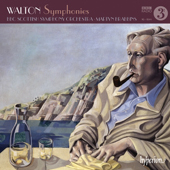
DEFINITIVE RECORDINGS

I've often wondered as to why Hyperion, one of the top "British" labels, had never until now produced a recording of either symphonies of
William Walton (1902-1983), one of the top "British" composers of the 20th century. His Symphony No. 1 in B flat minor is,
after all, a landmark in the symphonic canon, and in my opinion, one of the strongest symphonic statements of the last 100 years. The first minute of the opening movement
alone is enough for the listener to feel that something monumental is about to unfold, and does it ever. The main theme in particular is pregnant with potential, and Walton
works it perfectly, creating wave upon wave of tension and drama, of push and pull, the main ideas being tossed around the orchestra, until at the 13:25 mark when the
conflict is at its boiling point, in a magnificent coup de théatre, he releases the tension and concludes the movement on an upbeat and epic note. The second
movement, Presto con malizia (malicious) is a tour de force in devilish rhythms and off-beat accents all put together with great craftmanship. Some of the
main ideas from the opening movement are re-introduced in the third, slow movement which opens with a beautiful flute melody, but are now given a darker, more
emotional treatment, and the movement ends in hushed resignation. The final movement opens with a ceremonial sounding fanfare, and the central section of the
movement is a fugue written on a grand scale with, again, plenty of momentum and energy. The fanfare returns to finish the symphony in an impressive display of
resolute determination. Be it for artistic, musical, emotional or technical reasons, this symphony rivals any of the top ones ever written.
After a long gap of about 25 years came the Symphony No. 2. It was poorly received partly due to the fact that by the mid-1950's the
symphonic form was considered outmoded. It has not been recorded or performed anywhere near as often as its older brother, and because of that neglect, has acquired
a negative reputation. It may have lost the impetuousness and muscular power of youth, but is just as passionate and technically polished, if not more so. Walton's years
of experience show through the fabric of this one, with tight control, attention to detail rather than scope, and a more calculated mastery of complex material. Emotional
impetus dictated the flow of No. 1, whereas theoretical formulas and technical precision determined the outcome of No. 2.
The Hyperion executives must have been waiting for just the right moment, for just the right interpretation to come along, to justify releasing yet
another recording of these symphonies. And their patience has been well rewarded in this new recording with the BBC Scottish Symphony Orchestra
conducted by Martyn Brabbins. In both works, the conductor always conveys Walton's intentions well and leads electrifying renditions of these two
symphonies, and when called for in the epic No. 1, pulls out all the stops to deliver an account to match.
Rare are recordings of No. 2, rarer still are good recordings of No. 1, and almost non-existent are recordings of both symphonies together. Last year saw the release of
one on the BIS label, but I believe most of the previous recordings are no longer in circulation. So if, like Hyperion, you've been waiting for a golden opportunity, don't
miss out on this great recording.
Jean-Yves Duperron - August 2011